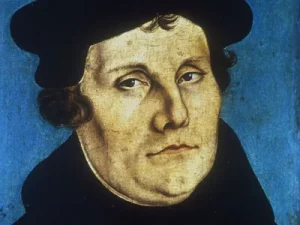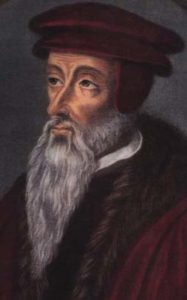Christian Roots of Capitalism
The book, The Protestant Ethic and the Spirit of Capitalism, by Max Weber was a challenging read for me this week. It was necessary more than ever to go to videos and websites for help dissecting the material. I watched a professor give a talk on the topic from this title after reading most of this book as best I could, and think I have a grasp on the concepts now, thankfully.
For the purpose of this blog, I would like to write a bit about Martin Luther and the Protestant Reformation which was the catalyst for free-market capitalism as we know it now. [1] After that, I will touch a bit on John Calvin, particularly on predestination. Then I will write about other denominations and their influence on early capitalism. Finally I will make an application of these thoughts to my own life and situation.
Martin Luther
Not long ago, I read a wonderfully written book on Martin Luther by Eric Metaxas. It was entitled Martin Luther: The Man Who Rediscovered God and Changed the World. Martin Luther is famous for nailing the 95 theses to the door. In fact, Metaxas points out in a bit of trivia that he probably didn’t actually nail them to the door at all. It was common practice at that time to paste things to doors instead. [2] Martin Luther believed that the indulgences of the Roman Catholic church were unbiblical. He set out to change those. [3] Metaxas points out that the consequences of his reforms went far beyond reforming the Catholic church – to forming new denominations and even causing political uprisings. [4] Perhaps most pointedly, the Reformation taught people that “work is good”. In fact, it is positive, saintly, and even holy. [5] Before the Reformation, work was considered punishment from the fall of man. [6] So this was a big change.
John Calvin
Among the five points of Calvinism is predestination. This is the belief that from the beginning of time, some people are destined for heaven and some are not. Those destined for heaven have their names written in the Lamb’s Book of Life. [7] So, some might ask, if your name is written in the Book of Life no matter what, then why not live any way you want to? Why not just party all the time? [8] In fact, Max Weber argued that people didn’t know if they were predestined or not. [9] It caused a lot of anxiety in their daily lives. They came to the conclusion that the mark of God was prospering in business. [10] So people worked harder to prove they were predestined.
Other Denominational Influences
Methodists taught that God loves an orderly life. Work is good. And that success in business is a sign that you are going to heaven. [11] Presbyterians lived frugally. They taught that you shouldn’t spend your money on yourself, but should reinvest it, and also give it to charity. [12] All of these ideas together: work harder, try to succeed in business, plan, be frugal and invest … these are all the seeds for free-market capitalism. [13] And they were planted by the denominations born out of the Protestant Reformation.
Application
John Scarbrough, the professor whose video I watched, said that the richest nations are Protestant today. The poorest are tribal. I have lived in both. I believe this is the truth. There is something to be said for an American in today’s society to dwindle all of their worldly possessions down to a crate the size of a twin bed as I voluntarily did when I moved to Kenya. Then further dwindled them to go live in a hut in the bush. Five years later I returned to the States with very few possessions in the world’s eyes. But don’t be mislead – I had everything I needed and so much more in things that don’t have a price tag. It would be difficult to say when I was the richer – now or then.
_____________________________________________________________________
[1] John Scarbrough, “The Protestant Ethic and the Spirit of Capitalism”, Lincoln Land Community College, 2014, YouTube, 20 minutes, Link.
9 responses to “Christian Roots of Capitalism”
Leave a Reply
You must be logged in to post a comment.


Hi Tonnett,
I thoroughly enjoyed your blog. Anything that involves Chruch History brings joy to me.
I loved these final lines: “Five years later I returned to the States with very few possessions in the world’s eyes. But don’t be mislead – I had everything I needed and so much more in things that don’t have a price tag. It would be difficult to say when I was the richer – now or then.” It made me think of Moses, in Hebrews 11:23-25 rejecting the riches and privileges of being in the Egyptian royal family, choosing instead the reproach of Christ. Thank you, once again, for sharing your inspiring story!
Thank you David for your comments. You’re always an encouragement.
Tonette,
I enjoyed reading this too!
Martin Luther: The Man Who Rediscovered God and Changed the World. Martin Luther
It was a lengthy book but it gives a thorough look into the life of Martin Luther. I learned many things. I did not know that he helped nuns, helping them realize that they can be married. Then he married one.
Thank you for sharing from your experience of limiting your possessions and how this did/does not change the value of your life. You have what you need…things that don’t come with a big price tag!
Tonette,
Thanks for sharing. I enjoyed the history lesson. I am intrigued by your final statement “I had everything I needed and so much more in things that don’t have a price tag. It would be difficult to say when I was the richer – now or then.” How did it feel when you first returned to the states? Was it overwhelming going from dwindling your riches down to now re-entering a place where you are believed to be blessed by God because of the amount of stuff you have?
Great post, Tonette. I really enjoyed tour dive into the views of the different individuals and denominations. I also really enjoyed your closing statement “that you had everything you needed” when you came back to the states. I have been on a few mission trips to tribal areas and when you come back to America, it’s such a culture shock. The material things just do not have the same impact. It’s almost obscene. In many ways, the missionary is the one being blessed, not the other way around. The unfortunate thing is that with time, we get sucked back into the American capitalistic society and the buzz wears off… Thanks for the reminder.
Tonette,
Your post shared great details that shed light on denominational influence “these are all the seeds for free-market capitalism.” You did excellent bringing in your personal story as you concluded. Indeed the price tag is where the world’s eye goes to define who is rich or poor, which is totally different from those that are Kingdom-minded.
Tonette, I love how you brought the history of Martin Luther and John Calvin into your blog post. The history of the Protestant Reformation is fascinating to me. The timing of when Luther nailed (or pasted) his 95 Theses just amazes me. It would not have had the same impact a century earlier. It was the Gutenberg press that made the dissemination of his theses possible. Seems to me like God knew what He was doing! There have been both incredibly positive results and serious negative results.
Thank you for sharing about your own experience of giving up everything to move to Kenya. When we moved to Northern California, we slimmed down our belongings, but nothing like that. It is not easy when you live in such a consumer culture to get rid of things. I have always been such a pack rat! Even doing my Weber blog, I lamented throwing away my readers and notes from college when we moved. But as you did, I am learning (slowly) that stuff is just stuff. What matters are the people. Am I loving my neighbor? Am I sharing God’s love with the people around me? You are a model of this.
You and I have talked before about some of this but I wonder… How can embracing simplicity and voluntary poverty allow individuals to experience true wealth? Should there be a program or experiment that we take on? Maybe a book to follow and see what happens in each other’s families?
Great post!
Do you have any anxieties about your relationship with God.? Is it important to have your name written in the lambs book if life.